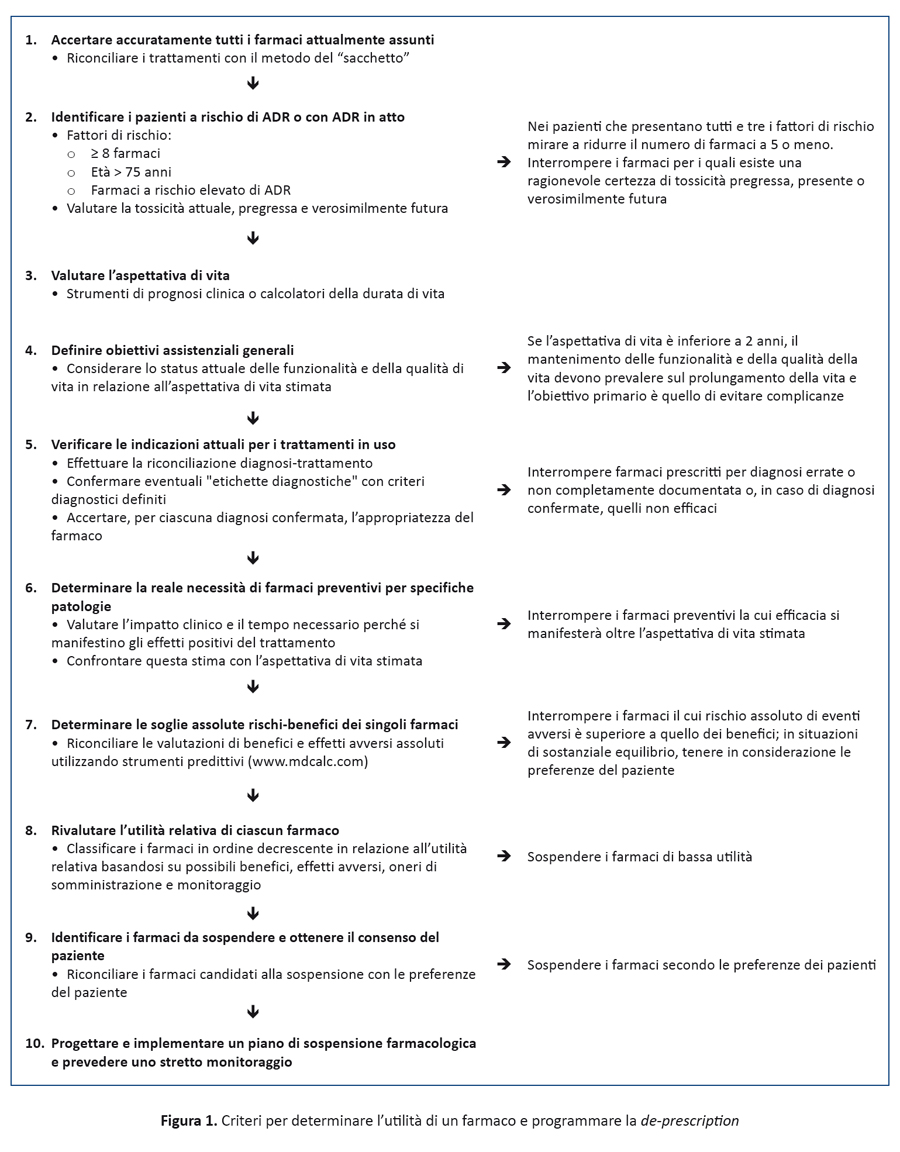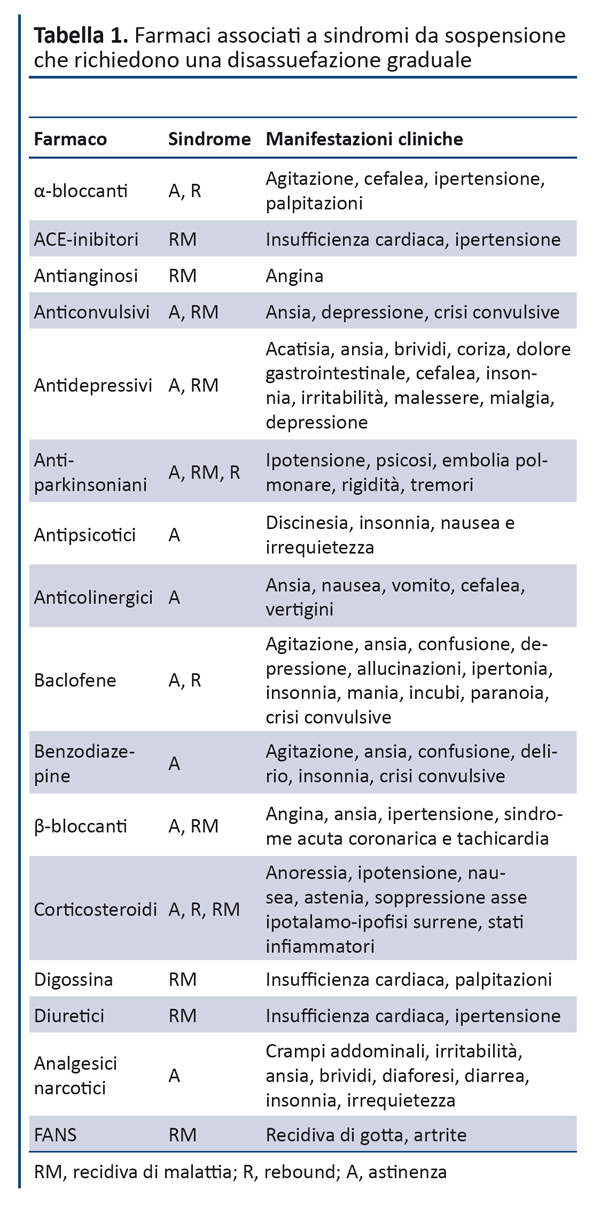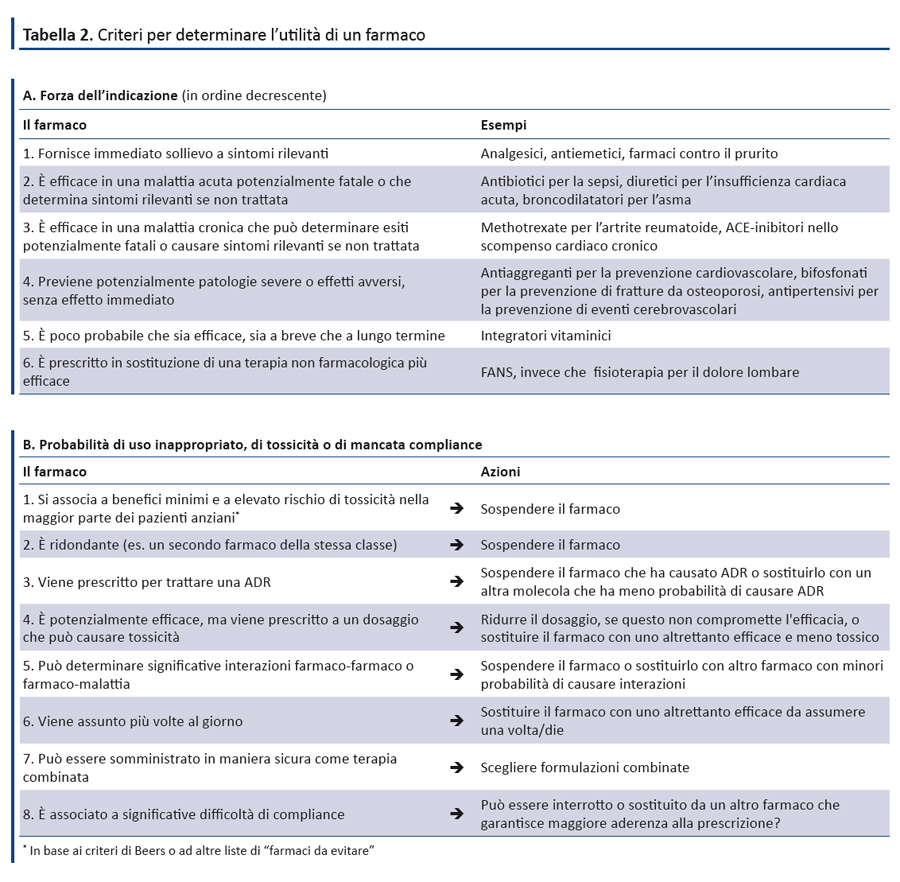Hot topics
Sospendere i farmaci negli anziani: un approccio evidence-based
Antonino CartabellottaEvidence 2013;5(11): e1000062 doi: 10.4470/E1000062
Pubblicato: 20 novembre 2013
Copyright: © 2013 Cartabellotta. Questo è un articolo open-access, distribuito con licenza Creative Commons Attribution, che ne consente l’utilizzo, la distribuzione e la riproduzione su qualsiasi supporto esclusivamente per fini non commerciali, a condizione di riportare sempre autore e citazione originale.
1. Kalisch LM, Caughey GE, Barratt JD, et al. Prevalence of preventable medication-related hospitalizations in Australia: an opportunity to reduce harm. Int J Qual Health Care 2012;24:239–49.
2. Kongkaew C, Noyce PR, Ashcroft DM. Hospital admissions associated with adverse drug reactions: a systematic review of prospective observational studies. Ann Pharmacother 2008;42:1017–25.
3. Doucet J, Jego A, Noel D, et al. Preventable and non-preventable risk factors for adverse drug events related to hospital admissions in the elderly. A prospective study. Clin Drug Invest 2002;22:385–92.
4. Chan M, Nicklason F, Vial JH. Adverse drug events as a cause of hospital admission in the elderly. Int Med J 2001;31:199–205.
5. Hanlon JT, Schmader KE, Koronkowski MJ, et al. Adverse drug events in high risk older outpatients. J Am Geriatr Soc 1997;45:945–8.
6. Buajordet I, Ebbesen J, Erikssen J, et al. Fatal adverse drug events: the paradox of drug treatment. J Intern Med 2001;250:327–41.
7. Hajjar ER, Hanlon JT, Sloane RJ, et al. Unnecessary drug use in frail older people at hospital discharge. J Am Geriatr Soc 2005;53:1518–23.
8. Mangin D, Heath I, Jamoulle M. Beyond diagnosis: rising to the multimorbidity challenge. BMJ 2012;344:e3526.
9. Scott IA, Martin JH, Gray LA, et al. Minimising inappropriate medication use in older populations—a 10 step conceptual framework. Am J Med 2012;125:529–37.
10. Scott IA, Martin JH, Gray LA, et al. Effects of a drug minimisation guide on prescribing intentions in elderly persons with polypharmacy. Drugs Ageing 2012;29:659–67.
11. Goldberg RM, Mabee J, Chan L, et al. Drug-drug and drug-disease interactions in the emergency department: analysis of a high risk population. Am J Emerg Med 1996;14:447–50.
12. Owen A, Cox S. Diagnosis of heart failure in elderly patients in primary care. Eur J Heart Fail 2001;3:79–81.
13. Meara J, Bhowmick BK, Hobson P. Accuracy of diagnosis in patients with presumed Parkinson’s disease. Age Ageing 1999;28:99–102.
14. The American Geriatrics Society 2012 Beers Criteria Update Expert Panel. American Geriatrics Society updated criteria for potentially inappropriate medication use in older adults. J Am Geriatr Soc 2012;60:616–31.
15. Gallagher P, Ryan C, Byrne S, et al. STOPP (Screening Tool of Older Persons’ Prescriptions) and START (Screening Tool to Alert doctors to Right Treatment). Consensus validation. Int J Clin Pharmacol Ther 2008;46:72–83.
16. Fried TR, Tinetti ME, Towle V, et al. Effects of benefits and harms on older persons’ willingness to take medication for primary cardiovascular prevention. Arch Intern Med 2011;171:923–8.
17. Al-Rashed SA, Wright DJ, Roebuck N, et al. The value of inpatient pharmaceutical counselling to elderly patients prior to discharge. Br J Clin Pharmacol 2002;54:657–64.
18. Garfinkel D, Zur-Gil S, Ben-Israel J. The war against polypharmacy: a new cost-effective geriatric-palliative approach for improving drug therapy in disabled elderly people. Isr Med Assoc J 2007;9:430–4.
19. Garfinkel D, Mangin D. Feasibility study of a systematic approach for discontinuation of multiple medications in older adults: addressing polypharmacy. Arch Intern Med 2010;170:1648–54.
20. Starner CI, Norman SA, Reynolds RG, et al. Effect of a retrospective drug utilisation review on potentially inappropriate prescribing in the elderly. Am J Geriatr Pharmacother 2009;7:11–19.
21. Graves T, Hanlon JT, Schmader KE, et al. Adverse events after discontinuing medications in elderly outpatients. Arch Intern Med 1997;157:2205–10.
22. Lindström K, Ekedahl A, Carlsten A, et al. Can selective serotonin inhibitor drugs in elderly patients in nursing homes be reduced? Scand J Prim Health Care 2007;25:3–8.
23. Gallagher PF, O’Connor MN, O’Mahony D. Prevention of potentially inappropriate prescribing for elderly patients: a randomised controlled trial using STOPP/START criteria. Clin Pharmacol Ther 2011;89:845–54.
24. Iyer S, Naganathan V, McLachlan AJ, et al. Medication withdrawal trials in people aged 65 years and older: a systematic review. Drugs Aging 2008;25:1021–31.
25. Hill KD, Wee R. Psychotropic drug-induced falls in older people. A review of interventions aimed at reducing the problem. Drugs Aging 2012;29:15–30.
26. Gnjidic D, Le Couteur DG, Kouladjian L, et al. Deprescribing trials: methods to reduce polypharmacy and the impact on prescribing and clinical outcomes. Clin Geriatr Med 2012;28:237–53.
27. Kaur S, Mitchell G, Vitetta L, et al. Interventions that can reduce inappropriate prescribing in the elderly: a systematic review. Drugs Aging 2009;26:1013–28.
28. Ostini R, Jackson C, Hegney D, et al. How is medication prescribing ceased? A systematic review. Med Care 2011;49:24–36.
2. Kongkaew C, Noyce PR, Ashcroft DM. Hospital admissions associated with adverse drug reactions: a systematic review of prospective observational studies. Ann Pharmacother 2008;42:1017–25.
3. Doucet J, Jego A, Noel D, et al. Preventable and non-preventable risk factors for adverse drug events related to hospital admissions in the elderly. A prospective study. Clin Drug Invest 2002;22:385–92.
4. Chan M, Nicklason F, Vial JH. Adverse drug events as a cause of hospital admission in the elderly. Int Med J 2001;31:199–205.
5. Hanlon JT, Schmader KE, Koronkowski MJ, et al. Adverse drug events in high risk older outpatients. J Am Geriatr Soc 1997;45:945–8.
6. Buajordet I, Ebbesen J, Erikssen J, et al. Fatal adverse drug events: the paradox of drug treatment. J Intern Med 2001;250:327–41.
7. Hajjar ER, Hanlon JT, Sloane RJ, et al. Unnecessary drug use in frail older people at hospital discharge. J Am Geriatr Soc 2005;53:1518–23.
8. Mangin D, Heath I, Jamoulle M. Beyond diagnosis: rising to the multimorbidity challenge. BMJ 2012;344:e3526.
9. Scott IA, Martin JH, Gray LA, et al. Minimising inappropriate medication use in older populations—a 10 step conceptual framework. Am J Med 2012;125:529–37.
10. Scott IA, Martin JH, Gray LA, et al. Effects of a drug minimisation guide on prescribing intentions in elderly persons with polypharmacy. Drugs Ageing 2012;29:659–67.
11. Goldberg RM, Mabee J, Chan L, et al. Drug-drug and drug-disease interactions in the emergency department: analysis of a high risk population. Am J Emerg Med 1996;14:447–50.
12. Owen A, Cox S. Diagnosis of heart failure in elderly patients in primary care. Eur J Heart Fail 2001;3:79–81.
13. Meara J, Bhowmick BK, Hobson P. Accuracy of diagnosis in patients with presumed Parkinson’s disease. Age Ageing 1999;28:99–102.
14. The American Geriatrics Society 2012 Beers Criteria Update Expert Panel. American Geriatrics Society updated criteria for potentially inappropriate medication use in older adults. J Am Geriatr Soc 2012;60:616–31.
15. Gallagher P, Ryan C, Byrne S, et al. STOPP (Screening Tool of Older Persons’ Prescriptions) and START (Screening Tool to Alert doctors to Right Treatment). Consensus validation. Int J Clin Pharmacol Ther 2008;46:72–83.
16. Fried TR, Tinetti ME, Towle V, et al. Effects of benefits and harms on older persons’ willingness to take medication for primary cardiovascular prevention. Arch Intern Med 2011;171:923–8.
17. Al-Rashed SA, Wright DJ, Roebuck N, et al. The value of inpatient pharmaceutical counselling to elderly patients prior to discharge. Br J Clin Pharmacol 2002;54:657–64.
18. Garfinkel D, Zur-Gil S, Ben-Israel J. The war against polypharmacy: a new cost-effective geriatric-palliative approach for improving drug therapy in disabled elderly people. Isr Med Assoc J 2007;9:430–4.
19. Garfinkel D, Mangin D. Feasibility study of a systematic approach for discontinuation of multiple medications in older adults: addressing polypharmacy. Arch Intern Med 2010;170:1648–54.
20. Starner CI, Norman SA, Reynolds RG, et al. Effect of a retrospective drug utilisation review on potentially inappropriate prescribing in the elderly. Am J Geriatr Pharmacother 2009;7:11–19.
21. Graves T, Hanlon JT, Schmader KE, et al. Adverse events after discontinuing medications in elderly outpatients. Arch Intern Med 1997;157:2205–10.
22. Lindström K, Ekedahl A, Carlsten A, et al. Can selective serotonin inhibitor drugs in elderly patients in nursing homes be reduced? Scand J Prim Health Care 2007;25:3–8.
23. Gallagher PF, O’Connor MN, O’Mahony D. Prevention of potentially inappropriate prescribing for elderly patients: a randomised controlled trial using STOPP/START criteria. Clin Pharmacol Ther 2011;89:845–54.
24. Iyer S, Naganathan V, McLachlan AJ, et al. Medication withdrawal trials in people aged 65 years and older: a systematic review. Drugs Aging 2008;25:1021–31.
25. Hill KD, Wee R. Psychotropic drug-induced falls in older people. A review of interventions aimed at reducing the problem. Drugs Aging 2012;29:15–30.
26. Gnjidic D, Le Couteur DG, Kouladjian L, et al. Deprescribing trials: methods to reduce polypharmacy and the impact on prescribing and clinical outcomes. Clin Geriatr Med 2012;28:237–53.
27. Kaur S, Mitchell G, Vitetta L, et al. Interventions that can reduce inappropriate prescribing in the elderly: a systematic review. Drugs Aging 2009;26:1013–28.
28. Ostini R, Jackson C, Hegney D, et al. How is medication prescribing ceased? A systematic review. Med Care 2011;49:24–36.






